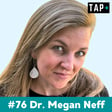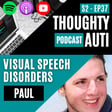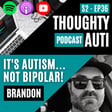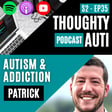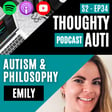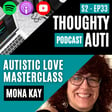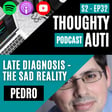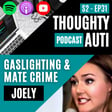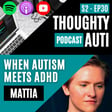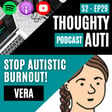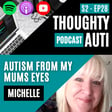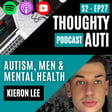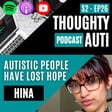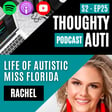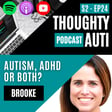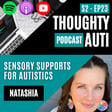Return of the Faulty Alti Podcast
00:00:07
Speaker
good day everybody and welcome back to another episode of the faulty alti podcast with your host mr thomas henley and you may be surprised to see that there is a new episode appearing on the feeds in the ether of the internet um since i have not probably posted the podcast for like at least
00:00:28
Speaker
three or four months. There's been a lot going on in my life and to kind of keep it short, I am pivoting towards making a lot more YouTube presentation style content and live streaming. It just seems like a good decision for me at the moment and the schedule.
00:00:44
Speaker
from now on will be around about like once a month i think and it's going to be kind of a here and there kind of approach to podcasting it's not going to be on a schedule but there will be podcasts coming out with different interesting people that i found on the internet who who also want to do a bit of podcasting so without further ado this is
Autism and Cannabis: Benefits and Stigma
00:01:22
Speaker
very interesting topic about autism and cannabis, which is something that has for a long time had a lot of stigma behind it, a lot of misinformation, a lot of quite strange laws around it, I think at some point.
00:01:40
Speaker
But it's something that has been increasingly looked into for its medicinal properties. And today I want to talk a little bit about the link between cannabis and autism, not due to the rates, but more what are the
00:01:57
Speaker
benefits, disadvantages, you know, possible experiences that people might have with cannabis. Things related to THC, CBD, you know, THC in the UK, unless you have a medical license, is illegal, recreational. In the US, it's a little bit different, I think, a few other countries as well. So, enough rambling by me.
Guest Introduction: Miyabi
00:02:20
Speaker
I have my guest here today. I've forgotten how to pronounce your name. That is awful.
00:02:28
Speaker
Mayebi? Mayebi? Miyabi. Miyabi. Okay, let's go. I'm gonna go for it again. No worries. Yeah, no, do it. That's really bad. It's actually not bad. I've heard a lot worse, so you're good, man. Okay. Okay. Well, we'll go for it then. How are you doing today? Yeah, I'm doing good. I'm excited to chat with you. I always... I really like listening to British accents. I don't know. It's like such a...
00:02:57
Speaker
calming and reassuring sound and voice. Yeah, I'm excited to be here and talk about it. This is something that is very central to my whole life and actually also my research career. Have you ever been to the UK?
Cannabis Accessibility: US vs UK
00:03:14
Speaker
I have not. I've had a layover.
00:03:18
Speaker
once but I think it was in London but it was not enough time to get off the plane or do anything. I played water polo in Italy for a bit and so we just stopped and had a layover but I didn't have time to actually leave and I would really love to visit.
00:03:38
Speaker
meet up with. There are great scientists doing advocacy work in the UK and there's research going on at universities and all of it is happening. So despite the laws still remaining frustrating in many countries, things are changing. There is a lot more information that we have both in the scientific literature from universities and in
Therapeutic Benefits of Cannabis
00:04:02
Speaker
the communities. And as you mentioned, the US, which is where I am, I'm in Massachusetts,
00:04:07
Speaker
You know, we have increased accessibility to medical cannabis and also to adult use recreational cannabis really significantly. And in doing that, we've found a lot of things. We've learned a lot of things. And I think one of the main things we're learning and finding, which we've already known, is that it's relatively safe, has a low toxicity, and has a really, really high potential therapeutic benefit.
00:04:34
Speaker
I think it's great that we're going to talk about all aspects about that and how specifically for atypical people, there can be potential sensitivities or even potential like hypo reactions like under reactions. So I think it goes both ways. Yeah, and it is interesting. Whenever it's, you know, there's been a lot of laws passed on particular compounds which
00:04:59
Speaker
It's kind of crazy thinking about it with like sort of the rampant use of opioids and things of that nature where it's only kind of, well not necessarily like in very recently, but recently that scientists have been able to start looking into things like the therapeutic benefits of like ecstasy and MDMA and
00:05:25
Speaker
Yeah, and it's huge.
Psychedelics and Modern Medicine
00:05:29
Speaker
I mean, that's a whole other piece I think I'd probably say. It's definitely not what I've done my formal academic and industrial research career on, but I have recently taken a course with Dr. Joe Tafur, who's a medical doctor. He's an MD, but he's also a trained Shippebo shaman.
00:05:50
Speaker
And he gives a course on integrating psychedelics into modern medicine, and I took it last year. And it changed my perspective on a lot of things. And I've used psychedelics medicinally, and I do advocate and talk regularly for them. I actually helped my city to decriminalize psilocybin-containing mushrooms for the medicinal benefits. And as you said about the opioid issues that we have going on around the world,
00:06:17
Speaker
And bringing it back to cannabis, we do know that for both of these things, psychedelics, but also with cannabis, we do know that cannabis can be used as a replacement or as something that can reduce the amount of opioids that someone takes who's in chronic pain.
00:06:32
Speaker
Pain is one of the top three uses for cannabis regardless of whether you have a medical card or you're using adult use or recreationally so you know we. We know these things cannabis is a plant grows out of the ground we've evolved with it and I for one definitely.
00:06:55
Speaker
in a state of disagreement with legislature that limits people's ability to use it as a medicine, especially when you could grow it. Yeah, well, I mean, I guess you can grow all sorts of like things which are not necessarily
00:07:12
Speaker
Right. That's what I'm saying. Right to tear a flower. Exactly. Or geraniums are pretty poisonous if you were to concentrate them, right? There's plenty of things that are unregulated agricultural or floral botanical, right?
00:07:28
Speaker
you know we don't regulate this way and those don't have therapeutic benefits so it is wild to me at least but i have a very difficult time understanding ulterior motive like i have a very linear
00:07:44
Speaker
I have a very linear
Henley's Cannabis Journey
00:07:46
Speaker
understanding of the motives of human health and the profitability of a corporation doesn't really factor in for me at all for why we should be doing the things that we do.
00:08:01
Speaker
I guess it's just how can you help people live a higher quality of life? Like you see all the suffering that goes on and there's so much suffering in the world just period. The world is suffering and this is kind of, you know, I'm Buddhist. I was raised like with a Buddhist, like my grandmother has like an influence and the world is suffering. So I get that. And like, wouldn't you want to decrease that? Wouldn't you want to like increase people's like health and happiness and overall quality of life? And it just
00:08:31
Speaker
So that part has never really made any sense to me and I've never really, never really understood it, you know. I feel that very deeply. I mean, I suppose a little bit of a background because, you know, I've talked about all sorts of kind of things on this podcast, but not necessarily like things that might be considered to be taboo, I guess, like to speak about, which is it is very silly to me because
00:09:01
Speaker
a little bit kind of my background. I did do biomedical sciences at the University of Manchester and recreational sort of medical sort of alternative compounds was not part of the curriculum, but I basically, I went to university
00:09:23
Speaker
and went into like one of the halls of residences, which was, I didn't know, but which was notorious for being kind of like a party destination. And at that time, I was very into my taekwondo, you know, I pretty much studied all day and then went to taekwondo in the evening and came back late. And I didn't get much, much interaction with the other students. But I had a few incidences of like,
00:09:51
Speaker
obviously like smelling cannabis and also people taking all sorts of drugs and such to excess. So I had my first sort of exposure to that, seeing that at university and
00:10:12
Speaker
You know, immediately I was, I've always been a very like teetotal, teetotal kind of minded person.
Medical Use and Stigma of Cannabis
00:10:19
Speaker
I'm like, anything that you take, you should not take. And, you know, I mean, at the time I was pretty much addicted to sugar, but I mean, it's same with alcohol or cigarettes. So many of us are though. Yeah.
00:10:33
Speaker
Coffee. Yeah. Caffeine. Caffeine. But I had that mindset and it was only until my second third year where I started to develop some close friends who started to challenge those beliefs a little bit. It took me a long time.
00:10:53
Speaker
to really accept it as like something that people do and not sort of tie it to their personality. Cause I assume that people who did that kind of thing were like bad people in my brain. Well, that's what we're raised. We're raised to think that. So that's not, you know, this is an, it's an intentional bias that has happened, you know, especially with people who are a bit older. It is changing, but for those of us who were raised before in,
00:11:20
Speaker
the US, it was 1996 in California. I was six. I think the whole experience with that and obviously making friends with people who did it regularly and talk all sorts of things, I got to a point where I was like,
00:11:44
Speaker
You know, like maybe I should
Cannabis and Social Connections for Neurodivergent Individuals
00:11:45
Speaker
look into this a bit more. And I started researching about like the actual like compounds and like how they worked. Then I got into watching like people's experience with it, which ranged from like recreational users to medical unit users to like people who describe themselves as like drug addicts, not necessarily marijuana, but
00:12:11
Speaker
you know, all sorts of things. And I think that there's one time that like a little kind of switch kind of clicked in my brain where I was like, I feel like for most things in life, if we haven't experienced it, it's quite difficult to like relate to someone who does this kind of taboo thing that, you know, you almost label them as like a different type of human.
00:12:42
Speaker
to sort of separate yourself a little bit or at least that was kind of my mentality towards it and the point at which things started to change a little bit was when I started making good friends with people and realizing that it wasn't tied to the personality, it wasn't necessarily like
00:13:06
Speaker
A bad thing. I mean, some things weren't good, but you know, it's not like a defining character trait. That makes sense. I think it's because we haven't been able to share, like for so many of us who are, you know,
00:13:22
Speaker
In the US, the term is stoners. I don't know if that's a term that's used here. Stoners are people who regularly use cannabis. My argument has always been that stoners are medical users, usually, even if you don't have a medical card. Typically, if you're going to be using cannabis every day, there's a reason.
00:13:44
Speaker
that you've been drawn to it and i think that there is this stereotype of stoners that they're lazy and you know no good like that's another thing that's another thing meeting like really high performing students who just look like medical students particularly who just
00:14:07
Speaker
All the time they were doing something. Yeah, no. I mean, it's a stereotype that they teach us because it's a fear. And it is something that does exist, right? Like if we are talking about potential negatives, like you mentioned sugar, we're talking about alcohol, like the potential to overuse anything exists. And that is true of cannabis as well.
Cannabis Sensitivity and Neurodivergence
00:14:32
Speaker
And overusing cannabis does lead to people
00:14:35
Speaker
you know lacking motivation and you know it can lead to an any number of issues that do fit that stereotype but. For the most part a majority of people who use cannabis don't but until more recently it actually has been unsafe to.
00:14:53
Speaker
be visible with that identity it's been legally unsafe for you to do it and i never just like i'm throwing this out there like i never thought that i would be as open as i was in it even though i got my phd in the system of the brain that works with cannabis you know i never talked about it during my phd ever it wasn't until three years afterwards that i even first said it right that i was like
00:15:23
Speaker
Okay, and now it's been two and a half years since then and my perspective has changed so much more since then because I view it as an accommodation for me.
00:15:37
Speaker
It's, it's absolutely a medicine to yes, that it fits that role. But it's an accommodation for my disability that allows me to live a very high quality of life and function very well professionally. And it is a absolutely necessary accommodation for certain settings for me like networking events and high demand social or stimulatory environments.
00:16:04
Speaker
I mean, yeah, I mean, it's, it's, I feel, I feel like you can, you can definitely overuse anything to some degree. Like you can overuse water. Yes. That's actually a huge risk of MDMA. We were discussing MDMA Amali before, so PSA people, like it makes you really thirsty, but don't drink too much water. That's like the, that's one of the biggest risks of that. Plus that ecstasy is usually mixed. That's like typically a mixture.
00:16:33
Speaker
But that overuse potential exists with everything. Well, I know you've kind of talked about some of the reasons and sort of your journey or story sort of getting to this point. Do you think there's anything else that if you can kind of think about, I guess, sort of like a mission statement in your own head?
00:17:01
Speaker
of things that sort of encourages you to do the work that you do, do the online work that you do and be open about it. What would that look like? I think more recently I've been finding that I like to help other people find their own way and enable other people to feel that they have the knowledge to explore safely.
00:17:30
Speaker
options that are available for us here that don't have a lot of guidance and the education is it's difficult the barrier to access is very high and so you know my mission really is about helping other people who are like me come to the understanding that I have because I have
00:17:48
Speaker
A very deep and broad understanding of how I use cannabis for my mental and physical health and it changes every day. Excited to
Self-regulation and Overstimulation with Cannabis
00:17:58
Speaker
learn. We talked about it just this morning. I was just saying like oh actually like I need a little bit more of a dose before we get started like but I measure it based on how I feel and based on the demands of the day and
00:18:11
Speaker
That understanding came from a really deep understanding of my own brain, of my own disability, of my own strengths and weaknesses. And how can cannabis be a tool just like caffeine? How can it be a tool to help me? And how can it be a medicine? And how can it be an accommodation? And how can I get the maximum of that with there's a whole bunch of different things. I mean, we probably get into it, but there's a lot of different products.
00:18:40
Speaker
for now, for you guys where there's not as much accessibility.
00:18:46
Speaker
it will have to be increased once more accessibility comes about. But the number of products, the type of product diversity that we see in the markets over here is incredible because it means that it's different medicines and different medicines work for different people. And so, you know, I want to enable people to be able to navigate all of those choices and feel like they have some form of direction and that it's not just like a blind trial and error of
00:19:14
Speaker
Well, I hope this works today because that's not a good medicine.
Understanding Cannabinoids: THC and CBD
00:19:18
Speaker
A good medicine is going to be reproducible, right? Yeah. And I think what you said about sort of the range of product is quite apt for people perhaps in countries where it's not part of the medical system, where it's not kind of recreational because
00:19:38
Speaker
you know obviously when you have a system like that which is not sort of looking into and you know making sure the quality of certain things and understanding the different because it's not just one thing it's
00:19:54
Speaker
It's a lot of diff, it's a plant and it has very large variances in what compounds are actually within it. So it's like, and I think that's probably... It's beautiful. It's a beautiful variation. I mean, it's a diversity. It's just like neurodiversity. It's chemo diversity, chemical diversity. Endodiversity.
00:20:16
Speaker
Yeah, cannabinoid diversity, terpene diversity, flavonoid diversity is like volatile diversity is like there's I think it's depending on what paper you're going to look at. There's anywhere between 300, 400, probably plus, plus, plus, we haven't just like discovered them different molecules. That's that's kind of a good a good sort of segue into like one of the one of the first questions I had for you, which was, you know, I suppose
00:20:46
Speaker
speaking in more of like a a science media kind of way perhaps a little bit more lay but not not too much yeah could you tell us a little bit about the sort of the core like compounds uh present in in cannabis and what kind of effects they have etc what they
00:21:10
Speaker
We don't know the answer to it for all of them either. And then also, it will vary from person to person, which is another reason why I think education is so important. But in a nutshell, I'm going to break cannabis up into two different types. There's the traditional type of cannabis, like medical cannabis that people think of, which would be high THC.
00:21:31
Speaker
THC is tetrahydrocannabinol and it is a molecule that's in the cannabis flower. So the flower is actually the part of the plant that contains the most of the active molecules. That's not to say that the other parts of the plant don't have value. Like traditional Ayurvedic medicine uses the leaves to make bong.
00:21:53
Speaker
And there's plenty of other uses for the different parts of the plants, but the flower has the highest percentage of cannabinoids. The cannabinoids are viewed as the active molecules that interact with the brain and body that create the effects. TSC, CBD. Yes.
00:22:10
Speaker
Exactly. And all the little letters that come after it. CBG, CBN, C, CBT, CBE, CBL. I mean, it goes, it continues on. And they're all very, very similar to one another. They actually come from the same starting material and
00:22:26
Speaker
We don't actually know a lot about those rare, the rare cannabinoids. So I'll rewind them and go back to THC. That's the main active one. This is the primary cannabinoid that people are thinking of when they're thinking of cannabis, when they're thinking of someone getting high, you know, it's associated with euphoria, it's associated with, you know, the mental and physical effects, like an interesting physical effect is that it'll make you cold, drops your body temperature a little bit.
00:22:56
Speaker
I don't know that one. Yep. It's one of the reasons why there's a theory out there that's one of the reasons why also in desert regions and stuff, that hash is very, very prevalent in some of those cultures. So THC binds to a receptor in the brain called the CB1 receptor and turns it on. And it's that action that
00:23:23
Speaker
starts a very complex domino effect that can lead to some of the effects. Now, if we're talking about therapeutic benefits of THC, probably the most powerful therapeutic benefit of THC is that it can increase your appetite. And that's not always a good thing. Some people are like, oh, I don't want the munchies. And it doesn't always happen. I don't want that. Yeah, I mean, it doesn't happen to everyone. I actually haven't gotten them. You already get it in my tablets. I haven't gotten the munchies in years. But I mean, if you're lifting, you're probably going to be hungry.
00:23:53
Speaker
The therapeutic benefit there has to do with people who are struggling to keep weight on while they're trying to battle something like cancer chemotherapy or HIV.
00:24:10
Speaker
It's a powerful therapeutic effect. Now, the other therapeutic effects that come with it are vast and huge. There's general mental health therapeutic effects. It's an anti-anxiety. There's been some research on it being an antidepressant, and this is where there becomes a lot of gray area when we talk about it. I'll list the positives, then we'll go into the negatives later.
00:24:33
Speaker
It's an anti-inflammatory so it reduces inflammation and that has all sorts of effects on chronic pain and skin stuff and then it also reduces blood pressure and that's really useful specifically for like things like glaucoma but also just like in general for blood pressure and
00:24:54
Speaker
I ran a survey earlier this year, and to my knowledge, it's the only study that's looked specifically at neurodivergent people who use cannabis and why, right?
Cannabis in Pain Management
00:25:04
Speaker
Like, what are the therapeutic benefits? Now, the top three are the top three that are the same for everyone, like for the neurotypical, the general population, which includes all of us, which is pain, sleep, and anxiety. Those are the three top uses for cannabis.
00:25:22
Speaker
It's the main and most, I mean, they're also the top uses for pharmaceuticals as well. So they're like the three most commonly used needs. Pain medications can be like, I mean, I'm hard pressed to think of a pain medication that's like really effective that doesn't cause significant dependency or addiction in the long term.
00:25:48
Speaker
Yeah, it's difficult because pain is a powerful stimuli. Cannabis, I think it's very different in the way that it modulates pain. I mean, it acts upon a totally different system. It's not as powerful, I will say that. I don't know almost anyone who would make the claim that it's just as powerful as an opioid, but it's powerful enough that if someone wants to reduce their opioid use or get off opioid use, cannabis is very powerful in helping them to do that.
00:26:17
Speaker
Like chronic pain aspects of it. Exactly. Like pre-arthritic stuff. I have chronic joint pain. I'm hypermobile and it helps me with that. Very common for autistic people, I'd say. Yes, yeah. Oh my gosh. With all the overlaps of like the weird body, weird brain kind of.
00:26:38
Speaker
kind of synergy there. And I actually think that's one of the reasons why cannabis is such a powerful tool for neurodivergent people is that there is this overlap between chronic pain, mental health, and GI issues. And those are three kind of really big, broad—I've been calling them the triad of suffering because that's how I've felt about them from my
00:27:00
Speaker
Like a flare in one will cause a flare in the other and then almost always that third one is going to act up because you're not taking care of yourself. You know what I mean? Like it's, it can be a really fast downward spiral into that triad of suffering.
Social Connections and Cannabis
00:27:15
Speaker
And actually, cannabis helps with all three of those things. And a lot of the therapeutic potential does have to do with THC. And I love CBD, and I'm going to move on to talking about that, but I'm going to end my piece. Oh, sorry, go on. I was just saying I'm going to end talking about THC, just saying that it's effective, it has therapeutic value, and that it has a social recreational component too.
00:27:40
Speaker
But recreation is therapeutic as well. And I think that specifically autistic people, neurodivergent people who struggle with that closeness, to feel social reward, to feel an ease of social interaction is absolutely therapeutic. And just for me, from my own personal experience, I never formed very significant social bonds until I started using cannabis. It allowed me to
00:28:09
Speaker
to form deeper relationships with other people. And that has gone on to save my life because the friendships that I've been able to form and the significance of all the relationships in my life, I cherish them so much. I love my friends. And I would not trade anything in the world for my ability to make friends, which I didn't have, so.
00:28:34
Speaker
Why do you think that is? Do you think it's like a lot, because it's really interesting, because obviously like... Do you want me to get into the real nerdy? Yeah. I'm going to get into the real nerdy. I mean, maybe I should just leave that for one of the later questions. No, no. I see some stuff on like oxytocin. I love it. Yes. That's what I was going to say. The endocannabinoid system actually controls and mediates oxytocin signaling for social reward.
00:29:01
Speaker
No way. Social reward is, yeah, the enzyme that I studied for my PhD is actually the mediator, which I think is so cool, but it's so full circle for me actually. But social reward is the happiness that your brain feels when it's interacting with other people.
00:29:20
Speaker
It's not that I wasn't happy. The way that I described the experience of it in my own brain was that I just always was on the outside. I just was never fully in there with everyone else. My hands were pressed up against a glass and I was sliding off of them. I could never break through. I was always just right there. I saw it happening and I felt myself on the outside. I did. I knew that I wasn't connecting.
00:29:47
Speaker
And I really wanted it. It's that kind of sense of isolation or loneliness. I think a lot of autistic people listening will probably be able to empathize with that feeling, especially during the school experience. Oh, that was so lonely and just sad and terrible. I remember someone telling me that
00:30:12
Speaker
High school is like a school in general. It's just the best time of your life and I was like, I really hope not like I'm so glad that wasn't true. Like I like you know for people who are not gonna be like late in life diagnosed then I suppose that maybe they were happy and different experience and the first time that I ever smoked weed ever I was 15 and
00:30:39
Speaker
I distinctively remember this because it was the first time that I was able to glance at someone in their eyes. I held eye contact for maybe one or two seconds. That was extremely long for me at the time. Now it's like I could do that no problem. That's not hard for me at all anymore.
00:31:02
Speaker
But at the time, that was something that I'd never done. And it was something that always, if it happened to me, it would feel literally like someone took an ice pick or something and was shoving it in my eyes. It would feel like my head would jam out of the back of my head. And I'd be like, don't look at someone in the eyes. It hurts. It hurts. It's fearful. It triggered all these emotional. I don't even know how to describe it, really. Have you ever experienced that piece? I know it's pretty common.
00:31:28
Speaker
Yeah. For people to not like eye contact, but that was kind of like a physical response.
Social Mapping and Cannabis
00:31:34
Speaker
I'm kind of like middle of the road, I would say. I think I don't like eye contact as much as most people. I tend to be, you know, 70% of the time I'm not making eye contact and 30% of the time I am.
00:31:51
Speaker
I tried 50-50, which is what people recommend for like friendships and dating and like workplaces and stuff like that. I love that there's a recommendation for that. All right. I'm going to keep that in mind for like if I have to interact with a neurotypical. Well, then I mean, we can go into like the social perceptions that people have from very, very minor things like that, which is totally totally. They think you're sketchy or that, you know, whatever. Yeah. Not interested in what they're saying.
00:32:20
Speaker
Yeah, that one gets me because I listen better when I'm not paying attention. When you're looking away, it's just like, someone said, oh, I want to talk to you something important. Okay.
00:32:29
Speaker
Okay, oh my gosh, you're so right. You're like, okay, you want to tell me something important? Hold on, let me go do something else. Let me draw while you're talking to me. And then I'll like actually be focused, you know. Used to drive my friends that I took classes with crazy because I listen the best in lectures when I'm doodling. Like that actually is, and I'm an auditory learner, which is lucky and probably another one of the reasons I succeeded in academia.
00:32:55
Speaker
Like I could just I would just doodle in class all the time because that's how I would intake the information the best. You know, it doesn't look like I'm paying attention, but that's the way that it works the best for me. And I know with the eye contact thing, I guess it's really common and it corrected itself, quote unquote.
00:33:14
Speaker
at the age of 15. And I always was able to force myself to do it, right? It just was something that I really did not get or like. And so the first time I smoked weed when... Do you think that's related to the social reward aspect of the RSR?
00:33:29
Speaker
I'm not sure if it's just related to like overstimulation in general and that eye contact is a lot of attention. It's a lot of like, you know, it's like similar to like when we got married, it was like, or anytime that you're like, a lot of eyes are looking at you, like you can feel them. And I don't know if everyone can feel them, but like I can feel the eyes like on me.
00:33:51
Speaker
And I think that there's a lot of overstimulation in your brain, then that attention itself is a huge stimuli that can be, you know, jarring to people. And so I think it's like, you know, that's also why for you when you're saying like, you know, it's like, Oh, listening to I'm gonna listen to you. I'm gonna like, look away. It's like, because you want to avoid the stimuli that's going to distract you from from the
00:34:18
Speaker
Especially if you're trying to like force yourself to do it, it gets to a point where you're like, oh my gosh, look at them for 50% of the time and looking away and like, what are they talking about? Oh my gosh. I did. I did used to do that. Man, I remember that. I do remember thinking about that. I have like a very complex set of scripting behaviors that I've sort of like been editing out of my professional.
CBD: Market and Perceptions
00:34:44
Speaker
behavior set or not not editing them out just being more conscious of them and understanding why i'm doing them and like where it used to be that i would show up to like a professional situation and.
00:34:55
Speaker
If there's more than two people present, I will not form memory of the interactions at all, and I'm just going. I'm like a robot. I'm just reading people's body languages and talking about their interests the entire time and having this really complex map of categories in my brain of what that person's interests are and where they're from and where they went to school and what they like to talk about and that person and seeing if there's an overlap and then connecting the two of them into a conversation and then
00:35:21
Speaker
that person hasn't talked in a little while, and they look a little bored, maybe you should talk to them. Like, all of that kind of like, just complex stuff that then at the end of that, I would, my body would just crash. Like, you know, like at the end of all of that, my body and brain would just be like, nope, that was way too much processing, you know? I do relate to that. Cannabis has been interesting for that, like, sorry, go ahead.
00:35:49
Speaker
What about CBD? Because that, you know, for anyone who's in the UK, you will undoubtedly have seen some corner shops selling CBD vapes or lollipops or drinks and there was a big craze about it, perhaps like, I don't know, two or three, four or five years ago or something.
00:36:11
Speaker
Probably when the farm bill in the US passed because it immediately made it more accessible to us. I think it always was accessible to you, but it wasn't like as popular. Maybe no, I know it definitely wasn't as popular, but then I go by like the.
00:36:28
Speaker
I don't know how to describe it. Maybe like the British version of Whole Foods, like a Holland and Barrett is kind of like the supplements and the sort of organic kind of natural focus. Yeah, we saw that CBD in there and obviously like, you know, looking into it, it's not the best quality, but it's definitely like a round. And so I feel like a lot of people in the UK kind of either have this perception of it
00:36:59
Speaker
like still still being somewhat taboo or just being like a stain coil like just another like supplement that people have
00:37:08
Speaker
Oh, that's so hard because quality is difficult without a certificate of analysis or a COA, like a third party. And again, when we're talking about product quality and how we have so much product diversity, with CBD, I really believe in full spectrum products, which means it's everything in the plant, which means that it has a little bit of THC, like not enough to make you feel pretty much anything, but enough that it's... The entourage effect or something. It is.
00:37:37
Speaker
Yeah, the entourage, that's perfect. The entourage effect is actually a term that was coined to talk about our own brains and the endocannabinoid system has an entourage effect. And then that term got hijacked to apply to cannabis, but it makes perfect sense with cannabis too. I mean, we have a complimentary entourage effect going on and that's one of the reasons why I'm a big promoter of like full plant extracts that contain everything in the plant because there are hundreds of molecules and
00:38:07
Speaker
So when it comes to hemp, CBD is really similar to THC. The molecules are very similar, but they feel very different and they actually interact with different parts of the brain and have different, or sorry, different receptors in the brain and have different interactions with those receptors. And so CBD is non-intoxicating. It does not alter your state.
00:38:31
Speaker
It's a powerful anti-inflammatory. People use it for all the same reasons, pretty much. But I think that it's, my personal opinion is that its biggest therapeutic value is probably in like a chronic dosing routine for most people. And I think it's most powerful therapeutic effect is that it's an anti-seizure molecule and that it's a really powerful anti-seizure molecule. It means it also helps for migraines. They share an iteration. THC helps for migraines as well.
00:38:59
Speaker
I think for CBD, because it's so accessible, you know, there's been a good amount of research that's come out recently about aversive behaviors like for autistic kids and CBD or rare cannabinoid formulations. And it's complicated because a lot of these studies, they have different dosings and there's different and then how does that compare to what's on the market, etc.
00:39:23
Speaker
And so it really still is going to be trial and error. But if someone to me tells me like this is just an example and I'm not going to like give any specifics, I'm not a medical professional. This is not medical advice. We are not suggesting anyone do any of these things and everyone should check all the laws in their local areas before they choose to do whatever they want to do. But if I were to instruct someone in the beginning, which I do often,
00:39:48
Speaker
suggest like how someone would try it out it's always just to start with the smallest amount you know like to start with one start with half of one you probably won't feel anything right cuz you're not gonna feel anything and then you're gonna feel safer being like okay i'll try a little more right and.
Cannabis and Pharmaceuticals
00:40:05
Speaker
You get to a point where like maybe you are going to like you try a little more and the other thing is maybe you try doing this over the course of at least say like two to three weeks because even with pharmaceuticals, sometimes you don't see the therapeutic benefit until a few weeks has gone by and one of the biggest benefits. Yeah, one of the biggest effects for me in cannabis is definitely a prolonged effect.
00:40:27
Speaker
So it's the reason why I use cannabis every day. It's the reason why I treat it as a medicine this way is because the effect will build and stabilize within my body. And so like maintaining it at that steady state is actually what keeps me stable. It helps you with mood regulation. It helps me in general with chronic pain, with my GI stuff. Because it's stored in like the fat stores in your body, isn't it?
00:40:51
Speaker
It is and on top of it being stored in your fat and then re-released because as you like exercise or walker throughout your day on top of that it also creates changes in the levels of the receptors like in the brain so every time that it's activating these receptors
00:41:09
Speaker
It sends a signal and your body and your brain is always changing. It's always changing from one thing to what it's going to be in the future. And so it'll signal your body and brain to change either different levels of the receptor, different expressions of the areas of where the receptor will be localized, et cetera. And we don't fully understand these long-term effects.
00:41:37
Speaker
And to say that we don't understand it in cannabis in THC and CBD, I will throw it out there and say that we don't fully understand it in the psychopharmaceuticals as well. So for all of the unknown that I'm describing in receptor pharmacology, it exists as well in the psychopharmaceuticals. And so it's the same kind of level of unknown. So I don't want to scare people with this unknown and be like, well, we don't really know. There's a lot that we don't know. And I think that that's exciting.
00:42:07
Speaker
I think it's also a lot of promise. And when it comes to CBD, it's my life changed when I started using it medicinally, you know, I, I use it, I use it daily. I get the, the full spectrum. Yeah, for recovery, for recovery, it's huge. Like for the recovery for athletes, it's absolutely an integral piece. It's more for the, it's more for the anxiety and the sleep. Nice, anyway, it works.
00:42:32
Speaker
That's good. Yeah, yeah. I use like a vaporizer and I have like the, there's a few companies in the UK that sell like zero to you. Well, not zero, but like as reasonable as they can get it down. Yeah, within the legal limits for it to still be classified as hemp. So hemp is cannabis.
00:42:53
Speaker
hemp is a type of cannabis that just has way, way lower percentages of THC. And using hemp products, I will say that if you are going to get drug tested, using hemp products can make you test positive if they are full spectrum because they have THC in them, but it's not enough for you to feel the THC effect, right? It's a very, very mild effect.
00:43:19
Speaker
I started dosing CBD more intentionally and using it and evaluating it. Oh my goodness, a long time ago now, 2015. So eight years ago. And it really changed my perspective on a lot for me to begin to understand it and even to mix it with THC and to create ratios. And, you know, there are plants out there that are mixed as well, like plants, cannabis plants that have both. So they're between.
00:43:48
Speaker
Have an and traditional THC cannabis and there's plants that make both and then there's there's products that you could formulate to have both, right? Well, I think that that's like I think that's one of the.
00:44:02
Speaker
the the issues in the UK because it's um you know because it isn't there isn't like a variety of different strains and you know type types of it and ratios of CBD and THC that are like standardized and you do have to i think if you don't go through the medical routes and you don't get like the which i think you can do in the UK some some clinics that have that have done it
00:44:31
Speaker
If you don't go through those routes, you're getting something which has extremely high TSC, low CBD, very stuff that could have other things in it. It's not like it's gone through any process. It could have come from anywhere, really.
00:44:56
Speaker
Yeah, that's the problem of accessibility, right? This is an issue because the medicine is different and you could always mix them separately, which like I do, right? I have CBD products and THC products and you could mix them, you could dose them at the same time, right? Like one right after the other. But this accessibility to the diversity thing, it really is a medical issue specifically for neurodivergent people because we can react so differently.
00:45:24
Speaker
to any substance for that matter, it's worth noting that our brains are usually atypical and many of us take pharmaceuticals or have taken pharmaceuticals in the past and it is important.
00:45:40
Speaker
I haven't so I actually haven't personally had to deal with this in a long time because I haven't taken any psychopharmaceuticals in like 14 years or something. But I know and I want to just say a PSA that that it is really important for CBD specifically, that if you are taking pharmaceutical medications, that if you start taking really high doses of CBD, I'm talking like very, very high doses, like this is like
00:46:06
Speaker
in the 500 milligram plus per day dose, right? Like, and usually for context, usually like if you get like a whole bottle of something, it'll be only like a thousand milligrams or something, right? So, this is like a huge dose, but people do need that dose for seizures, like people do need that dose for migraines, like it is
00:46:28
Speaker
It is a high dose, but it is also a dose that people do need therapeutically.
Therapeutic Benefits for Neurodivergent Individuals
00:46:34
Speaker
But if you are at those really high doses, you need to be careful with your pharmaceuticals as well because it is possible for CBD to make those pharmaceuticals last longer in your body. So basically it doesn't break down as quickly, which then means that if you take more of it, you're going to have more of that in your body.
00:46:53
Speaker
Is it, is it to do with like the liver enzymes and stuff? Like, I think it was like, I'm from a university that's like SIP SIP 50. Yeah. It's a cytochrome, cytochrome P four fifties. Yeah. Yep. No, they, uh, they are grapefruit. Grapefruit juice is another one that inhibits grapefruit. Oh, I love grapefruits too. Well, not at the moment, I suppose, but.
00:47:21
Speaker
I mean I guess we have touched on like the potential sort of you know benefits around like social reward and perhaps you know a few sort of personal accounts from yourself but in your experience either with yourself through the research or from sort of personal accounts from other people
00:47:45
Speaker
How can THC and CBD be beneficial to specifically autistic people? I know you talked about the triad of suffering and stuff, but is there anything else that you'd like to kind of... I'm so glad because I started bringing it up when I was talking about the survey for the pain, anxiety, sleep thing, and I never got to the point with that story. That's just how I guess that's how it is. Some other tangent that was shiny caught my attention and I went down that hole.
00:48:15
Speaker
Yes, there are specific therapeutic benefits for autistic ADHD, neurodivergent, PTSD, TBI people. They're like for people with like different types of atypicality is definitely but you know, specifically going down the lane of the autistic ADHD, more like hypersensitive route, hypersensitive, hyperactive brain.
00:48:37
Speaker
Like neurotype type people, there are some unique benefits. Like one of them is the mood regulation benefit, which has been documented before. I've never heard of the mood regulation. Like I assume that because of the euphoria and stuff, it would be like a.
00:48:56
Speaker
Right, like a blifter. No, the mood regulation effect is one of the long-term effects. It's one of the effects that is, and this is also full disclosure, like this survey is just the first preliminary one. We are going to have to do way more research. Actually, my nonprofit is planning and is currently doing the very first piece of that research right now.
00:49:17
Speaker
Unfortunately, people in the UK can't take it, so I'm sorry. In the future, when we go global though, I'm going to send it to you so that you can share with everyone if they want to partake because it's really important that we start to document these unique therapeutic benefits. So mood regulation is one of them. Another one is focus and productivity.
00:49:36
Speaker
So it's interesting. Most people think cannabis makes people lazy, but a significant number of people will utilize cannabis to actually help them to focus and to get more things done. And then the last one is so close and so near and dear to my heart is overstimulation because sensory overstimulation is something that when I got diagnosed,
00:49:59
Speaker
When I understood that component of my brain, it changed my ability to regulate myself. When I understood that, you know, I'm not super light sensitive out of all things my wife is, but I'm super sound sensitive. I'm very, very sound sensitive. I'm very, very touch tactile.
00:50:23
Speaker
I'm pretty much hyper-sensitive to everything. Apart from heavy pressure and the stibular and proprioceptive stuff. I have horrible proprioception. I feel like I'm kind of small but somehow I'm running into everything.
00:50:42
Speaker
just all the time. I still don't know what the difference between vestibular hippo sensitivity and dyspraxia is. I'm still trying to find somebody who is dyspraxic but not autistic. I can't seem to find anybody. Interesting.
00:50:58
Speaker
There's all these overlaps right like this is so these are these accounts like this was what was really like so powerful to me is that I opened this survey for literally just twenty four hours it was just a quick like. Let's take a snapshot of those of us who are willing to contribute to this information and.
00:51:17
Speaker
I got over two thousand respondents in twenty four hours and over six hundred people out of those two thousand people wrote me a little message. I said if is there anything that you want to share like about your use and I'm also posting this publicly so it'll be it's anonymous like you can't see who posted what but that it you know you're.
00:51:38
Speaker
If you want to share your story, this is the moment because it literally is still on my website. If anyone wants to go look at it and read what other people had to say themselves from their own experience, it's up there.
00:51:50
Speaker
and there's 600 different little accounts, different things that people wanted to share. Some of them quite detailed about experimentation that neurodivergent people have used. In the survey, it was mostly autistic ADHD people. There was a smattering of a lot of other things and a small percentage of people who didn't identify as neurodivergent.
00:52:12
Speaker
This is really powerful because it's something that in terms of you asked me earlier what my mission was and the mission of my life really changed when I started being open about using cannabis for my mental health and about being neurodivergent and when I became out professionally about both of those things. My life changed drastically because people started
00:52:35
Speaker
really sharing their personal stories with me. And out of curiosity as a scientist too, I love the personal stories. I mean, human data is always gonna be the most important data for a pharmaceutical scientist. I study drugs in the brain. I don't think that it's as important to look at what it does in mice as what it does in humans. That's just my opinion. I value the human brain. In vivo, in vitro experimentation.
00:53:02
Speaker
I have weird feelings about mouse research because I did it, so I'm going to take a step back. I knew some people in Thailand who did cardiovascular research.
00:53:14
Speaker
I'm so not a fan. I said no thanks for me. They were traumatized for the first few weeks. No thanks for me.
Neurodivergence and Social Interaction
00:53:22
Speaker
They're really cute. I think that they're so cute. I know mice and rats. They're like little Cinderella, like Gus Gus. I'm just not a fan. Especially when it comes to neuroscience.
00:53:38
Speaker
Probably clear but my special interest is the neuro divergent brain on drugs like it's been my special interest for you know since i was fifteen. Before that my special interest were like way less interesting to other people so like that part is actually nice that it happens to be something that i think can help other people but you know i'm very.
00:54:00
Speaker
Like, because when you were saying about like, particularly for the sort of hyperactive kind of neurodivergent types.
00:54:11
Speaker
What about like individuals like myself who don't, who are just autistic? And I mean, there's obviously like loads of crossovers and it's based on like psychological traits and criteria that people can look for, but for the most of it, I'm autistic, not ADHD. Like... Well, I don't know that I consider them different, but that's also a different... No, that's what I mean. That's a whole rabbit hole of like,
00:54:41
Speaker
I don't necessarily believe they're different I think that they might be different expressions right or different like because from from me to you and like how I perceive your brain like I don't perceive that you have like any less going on up here than me it just has to do with like the expression right like
00:54:59
Speaker
And so in terms of for that like it is very very similar in therapeutic benefit it just like maybe looks different and if anything like you are probably more stoic and I have a lot of neurodivergent friends I mean I only I am pretty much only able to pay attention to neurodivergent people I feel like.
00:55:21
Speaker
I don't, I don't really find neurotypical people interesting enough to like keep, to keep my, cause I like the brain. I like brains. I like interesting brains. I like learning about people and I don't know. I do. I do have a particular fascination with neurotypicals. That's kind of, that's the angle at which I started my life understanding. Cause I just found them like very interesting. I'm not sure if they're autism researcher.
00:55:46
Speaker
Do you think that they exist for real? I'm not convinced that they exist and that they're not just like neurodivergent people who are like really really good at masking and like really really like
00:55:56
Speaker
Expending a ton of energy on that or something. I don't know I maybe I can't I can't tell I'm sure that they exist I've had a couple of friends be like, well, I'm neurotypical and I'm kind of like I don't think so but I just won't say anything because you know, sometimes that's like pretty insulting to sometimes people like I don't think disability is a bad word anymore, you know, like I
00:56:21
Speaker
I think that it comes with challenges, certainly, and that every every person is different. Different disabilities have different levels of challenges and like different types of disabilities also, right? So I'm not saying that. I'm not saying that for everyone, disability is not a bad thing because it can be it can be extremely challenging and it depends on your life circumstances and your
00:56:40
Speaker
your ability to provide for yourself. My particular sort of thoughts about like, like I've never viewed it as like necessarily like a bad thing. Like as far as like viewing it through like the social model of disability, it's very, that's very like applicable for me. But I think a word which is
00:57:06
Speaker
like characterized by an inability to do something feels quite like they just the the premise of it is negative not not meaning that it's like you're the roots of the words of the roots of the word is what you're saying because it's disability i feel that actually that's a really great point i've never really thought about it that way and that's the end you're that's the only thing and it's like i don't mind calling myself like disabled it's just that
00:57:34
Speaker
I don't like I don't either I don't think it's a bad thing but the reason why I think has to do with advocacy because I think that like viewing disability that way and understanding disability is more powerful to be able to fight for like advocacy for rights and like.
00:57:51
Speaker
So it's rooted in that, which is not... I've had conversations about this before too, because the same thing with cannabis use. What you're saying about the adult use, the recreational use market. For me, anyone who uses cannabis regularly, regardless of whether you have a medical card or not, it's likely medical, right? And there are problems with us over-medicalizing our terminology.
00:58:19
Speaker
At the same time the reason why i do it is for advocacy because it is the most powerful route to getting access it's the most powerful route for changing your legal.
Cannabis Use in Neurodivergence
00:58:28
Speaker
The legal perspective of the people who you know if anyone here who's listening to like if you know your local legislation like if you.
00:58:38
Speaker
are involved with anyone within your local town or your local city who may be interested in learning more about the therapeutic benefits about how that we could bring about community level change and how community level population level change with cannabis
00:58:54
Speaker
And with CBD, like is happening and does happen and can work, you know, there's information available, but you could just send them this, right? Like, or you could send them anything. That's not to be this, you know, but you can, you could send them. No, no, no. Go with that. Yes. Send them this podcast. Send them this podcast. Share it. It's interesting. Like and subscribe. And I mean, I think I think it's interesting because I think that it's perspectives that these are real perspectives and this is real data. And on one hand,
00:59:23
Speaker
This is new and it's new data. And like another data point I have to share is that our current study that we're running with 4,500 people who've responded and it's daily cannabis users, 91% of people who use cannabis daily, 71% of those people identify as neurodivergent.
00:59:43
Speaker
And it's a high overlap. That is a big crossover. And I've been in the industry now for close going on five years and I was in the academic research world of it before then. And I think I can say with confidence that like the stoners are my people. I am a stoner. I'm a stoner scientist. I'm part of this community. My friends and
01:00:04
Speaker
My community are people who use cannabis regularly, often, and heavily, and we benefit from it medically, you know? I mean, thinking about it, kind of, people that I've met at university and, like, sort of, in my life who do that, like, I'm very hard to press to find anybody who uses it regularly who either doesn't have mental health conditions or
01:00:33
Speaker
is different in some way. They're OCD, they're ADHD, they're autistic. Usually a highly creative type of mind. Whether you're working a creative job or not, just like a creative abstract sort of
01:00:52
Speaker
type of type of thinker. It's a, we are coining it and we're, we're publishing, we did, we gave a poster presentation so far, but our paper, we're caught, we're calling it the stoner neurotype. It is a specific subset of neurodivergent people who have chronic pain, GI issues and mental health issues that, you know, cannabis specifically happens to rebalance our systems. And, you know, it's not, that's what I think is, is like a really,
01:01:23
Speaker
you know anything which kind of touches on the aspects of like autism and mental health I find to be you know something definitely like worth looking into because I know that specifically like things like therapy that are not sort of guided by
01:01:42
Speaker
on either another autistic person, narrative urgent person or like a person who has a heavy amount of engagement with like the autistic community or knows people specifically within it as well as understanding the different nuances of SODA. It's very difficult to find that even in private practice but also
01:02:04
Speaker
like it's pretty much impossible through like general health care in the UK like to find someone who is you know going to be good for you in that sense. Same here. So we definitely do have a gap. Incredibly difficult. And very high rates of mental health as well.
Cannabis, Psychedelics, and History
01:02:20
Speaker
And we don't we don't we don't match we don't match with with neurotypicals often in a way that allows us to have that open relationship you know with a therapist or with like a to feel safe and
01:02:34
Speaker
seen in that mental health, you know, sort of system. And no, it's a major, this is a major issue. And it's actually one of the reasons why cannabis can be so helpful therapeutically that I don't know why this hasn't been used more readily because it's so easily accessible. But the psychedelic therapy model is like gaining speed, like you mentioned with MDMA.
01:02:56
Speaker
This is like, it's clinical, but it's- There's some crazy, like, results that they're seeing with, like, particularly, I think they saw something about psilocybin and, like, nicotine addiction. Something- Yep. Crazy recovery rate compared to, like, the two or three percent that you get with, like, traditional rates. I mean, nicotine was probably one of my most vicious addictions. Like, I feel like every time I rank the top three, I change the order based on which drug I've had the most recently, which, like,
01:03:25
Speaker
I haven't had a Benzo in a really long time, but the fact that it still makes my mouth water to think about it is kind of like, all right, that one was like clearly very addictive. And actually out of the three of the top three drugs that are the most addictive, that's the one I had a prescription for, right? It was like my prescribed medication. But the other two are alcohol and nicotine. I do get prescribed. I do get prescribed diet dyes, a pound for like panic attacks and meltdowns.
01:03:52
Speaker
I've never particularly had an issue with it, necessarily, but I definitely do relate to the nicotine aspects of it. The nicotine, the crave, the pull, and the loneliness, it's like an emotional addiction.
01:04:10
Speaker
It's a heavy one. There's been some really incredible stuff, and cannabis is interesting in that the endocannabinoid system and the serotonin system, which the serotonin system is what classic serotonergic psychedelics like psilocybin, like psilosa, and like LSD interacts with.
01:04:28
Speaker
The endocannabinoid system has a very close relationship with the serotonin system. It's actually something that I gave a presentation on last year. I've been very interested in that intersection because I think that there is an increased therapeutic benefit to using less of both of them together and it is very common for people to use them together. It's incredibly, incredibly common for people to mix psychedelics and cannabis. Endocannabinoid system is a
01:04:56
Speaker
Think like a crazy widespread throughout like the entire body, which I think is why like it has such like a variety of different effects. I know I was looking because there are like hot things that you produce like in your body, which are. Indogenous like things, things that you, you produce yourself, which acts within the endocannabinoid system. Like I think me.
01:05:24
Speaker
I don't know. Maybe THC is like an analog of anandamide, I think. It's not an analog, but it's a memetic. A memetic. A memetic. So it imitates it. It imitates it. Yes. It's like the anandamide is like the thing that you get when you have a runner's high. I used to be running all the time in the evening. Oh, yeah. I'm an endurance athlete all the way for that reason. Definitely.
01:05:51
Speaker
Anandamide is a special one. And the other one is 2AG. And yeah, our bodies are creating them right now. Like, everyone. That used to be one of my favorite things I used to say when I would be like, people, even if you're anti-weed, your body is making an endocannabinoid, like, right now. And it's essential for our, for our, like, brain survival and everything. And so it's absolutely like,
01:06:16
Speaker
It's absolutely something that we've evolved to have and it's an evolutionary medicine in many ways. We have evidence of, actually very recently we found evidence of actually using it as a medicine, but we have evidence from even before that we were using hemp to make rope from the late Stone Age period.
01:06:39
Speaker
So we've just had this very integral, intimate relationship with the Earth. I mean, it's not just with cannabis, it's with the Earth. And humans have moved on from that and separated ourselves from that relationship that used to drive what we are. We are animals here and we belong in an ecosystem.
01:07:04
Speaker
You know, I want to live in a house and have running water and electricity and all that. I love the internet and I'm kind of like, I love gaming too. So it's like, I like technology. I'm not saying that I don't like any of those things at the same time when it comes to like our health and it comes to like the food that we put in our body, like the quality of our water and what we're doing to our environments and everything. You know, you can't separate out our medicine from that. Like this is a conversation about
01:07:32
Speaker
how or it should be more of a conversation about how there are tons of natural medicines that are actually way more environmentally friendly for us to be naturally harvesting from out there or growing and cultivating ourselves or just in using them somewhat minimally or throughout our diet as food and using food as medicine.
01:07:55
Speaker
It's just complicated because we throw in too many variables and ultimately the actual healthcare system has evolved so far that a majority of people want to go to the doctor and get a pill. That is just the perspective that we have reached with where we've gone with technology and with medicine. I'm not saying that that's wrong. No, we could talk forever, I think, about all the impacts of
01:08:24
Speaker
modern day things on like our brains and how we work and our psychology and social media. Yeah. I think I watched a video recently from this YouTube call like the neurodivergent doctors talking about basically making a video on like the social model of disability about calling it that but
01:08:46
Speaker
No, he's talking about, oh, well, narrative because I've designed a world where they can, you know, they make it so overstimulating and uninhabitable in the long term so they can sell like psychiatric medication or something, which I don't believe, but it is a funny kind of like,
01:09:07
Speaker
I would watch that I like I I think that I don't think that it's so conscious right like I don't think that it's like so I don't even so conscious I think it's purely profit driven and it's purely about like leveraging and manipulating populations to purchase.
01:09:25
Speaker
More of things and get people to purchase things and that you're doing that while while trying to save the most amount of money, which means that you're developing procedures that are polluting the environment and that use chemicals usually. I mean, it's just.
01:09:41
Speaker
I think it's like all of these different factors that I can't even fathom in my brain. And I really only have a good, strong understanding of how it affects cannabis, right? That's the only thing that I feel I could speak on.
Cannabis Potency and Safety
01:09:55
Speaker
But an example of that is actually what has happened to the plant and to the genetics of the plant over the years. The percentage of cannabinoids in, say, the 70s, which is not that long ago, that's like our parents' time.
01:10:12
Speaker
The percentage that was in the of active molecules that were in the plant was about like 1%. And then they would say like, oh, really strong stuff might be 2 to 4%, right? All right. That is pretty much, that's pretty much. 22%. Right. Like this, I'm just like in the 70s, like what people were smoking then was pretty much hemp. Like it didn't have a lot of THC in it. And even the hash, which hash is a traditionally made concentrate and
01:10:43
Speaker
It concentrated, meaning like stronger, right? Like more actives. Even the hash back then was only about 20%, right? So now our flower is at the like 22% to 25%. I've even seen up in the 40s, which I'm like, what is going on there? I don't know about that. It's madness. It's madness. It is. I don't even know if I want that. Like no thanks.
01:11:06
Speaker
The plant itself is so strong. Our concentrates are so strong. And I mean, I'm not telling people not to use them. I think that they have medicinal benefit. It's just about understanding it and being careful, right? I have just when we were talking today about me being like, I need to redose so that I feel better, so that I'm better at this and I'm not too fast in my brain and moving past the topics before touching on them.
01:11:32
Speaker
formulation is like 85% THC. So it's extremely strong. It's extremely potent. And it's about understanding the dosage and taking a small little amount of it, waiting the full 10 minutes to see how it's going to feel before just continuing to take more and more and more.
01:11:48
Speaker
Those are the types of conversations that I think make people feel safer in that experimental phase of figuring out what does and doesn't work for them. I think that's so important because of how much product diversity there is and what we were just saying about the plant itself changing, the medicine changing. That's why I think we need more research on the people and on these tangible changes.
01:12:15
Speaker
Like it is what I plan to do for the rest of my life is to, you know, continue to advocate for people to be able to have access to this medicine and also for people to be able to have access to the education necessary to like be empowered themselves to have that self-determination.
01:12:34
Speaker
with cannabis because it is safe enough that we can. It's one of the only drugs that's safe enough. If you were to tell me like, oh, do I want to give someone self-determination with like an SSRI? No. Like, no. Or do you want to give someone like self-determination with like a stimulant, like Ritalin, consider Adderall, like Vyvanse? No. Like, absolutely not. Because
01:13:03
Speaker
The experimentation of that would be dangerous potentially, right? And so it's interesting, cannabis is non-toxic enough that actually we can have this self-determination through community education. And I think it's getting there. I think that this is going to be... I'm very hopeful for you guys over there across the pond, across the water.
01:13:25
Speaker
I would like to see it change just part and part of the fact, like even if ignoring all the medicinal aspects of it and the potential good things that it can bring, I think.
01:13:38
Speaker
Just the fact that we have tobacco and alcohol that's just rampantly binge-drinked and encouraged by parents and literally like a part of our culture that, you know, have manifolds, more detrimental effects on the population. Things such as that.
01:14:02
Speaker
I just part and part due to that.
Potential Negative Effects of Cannabis
01:14:06
Speaker
It just doesn't make much sense in my brain. I really think that this is also an autistic neurodivergent thing too though. It's like we're incredibly logical.
01:14:19
Speaker
Like we want something to make sense because we want it to have like a continuity or some sort of like parallel reasoning like what you're describing I feel like in my bones it's an inconsistency in reason and that doesn't, that doesn't, I don't like it. I don't like it.
01:14:46
Speaker
we've talked about like sort of I guess like the signs and the ways that it works and a lot about kind of like the benefits I mean I think it would be really good just to have like a I guess like a fuller picture on sort of cannabis as a medication thing or as recreational thing for people in general and also for autistic people because I have seen some
01:15:17
Speaker
particular things I think related to, there's one thing that was related to light brain development, like taken before like the age of 25. I don't know if you can shed much light on like the potential sort of negatives that we know.
01:15:34
Speaker
I'll say what I'll say what we do know and then I'm gonna put it a little bit into context that has a lot of personal bias right because as I said I started smoking when I was 15 and it wasn't a little it was like it was like the first day that I smoked I was like my brain needs this every day and I think I was right about that so that is my opinion but that being said I
01:15:57
Speaker
There have been some studies that have been done about, so in general, we're talking about all the big picture medicinal therapeutic benefits. It is true and you cannot deny, and I just even said it earlier today before we started, that it does have a slowing effect or it can have a slowing or a reducing type effect in general on the brain. And that over the course of like,
01:16:23
Speaker
Over the course of like repeated use that there are changes like we discussed earlier for positive benefits that there are changes in the receptor levels there are changes that there are long term changes that occur so there are good parts of that and there are bad parts of that as well and there's absolutely.
01:16:41
Speaker
There's absolutely truth to that and that it's not for everyone in general and for autistic people specifically in general seem to be sensitive to anxiety like in general seem to be like be prone to anxiety and that is a side effect THC so THC is what we would call by phasic.
01:17:02
Speaker
by meaning two phases, two phases. There's a lower phase and a higher phase. There's a phase of THC where it reduces anxiety, and then there's a second threshold where it will cause paranoia and anxiety. It will precipitate out paranoia and anxiety. Yeah, that's another thing that I was thinking about because obviously growing up socially different to a lot of people around us, we can
01:17:28
Speaker
somewhat develop like feelings of mistrust towards a lot like feeling that we have to protect ourselves and also like a lot of you know because we're trying to think ahead and protect ourselves and try and understand people's intentions. A lot of like paranoia sometimes as well. Social paranoia. I used to go through every one of my social interactions
01:17:50
Speaker
Sometimes I still reread my text messages, honestly. I do sometimes. I'll be like, was that rude? And sometimes I'll ask if I am uncomfortable. I'll be like... No, I do that as well. Sometimes I'm just in that state of mind and I'm like, well, I know I'm being stupid, but did that conversation go the way that I thought it did? Who knows?
01:18:12
Speaker
So there's definitely been studies that have shown that if you use younger than the age of 25, there are significant changes to your brain and decreases in certain areas. And that this can correlate to different, that it does correlate to different functionalities, right? Now, I don't love that data because I think that there's multiple ways to interpret it.
01:18:38
Speaker
But from my perspective, from my own brain, I do think that it decreased certain things in my brain somewhat permanently. I am slower, like in general, but I'm still plenty quick. Like I don't think that my brain needed to be faster. And I don't think that it should necessarily function faster. And in general, when my brain is functioning faster, it's not a great
01:19:08
Speaker
It's usually spinning into some form of like burnout, like running into a certain thing. So it's complicated because starting at a younger age can have semi-permanent to permanent alterations and we do know that. We know that with other drugs too though, so I'm throwing that out there as well because we also- The alcohol, the white matter deterioration.
01:19:32
Speaker
Yeah, and also the pharmaceuticals, the prescription pharmaceuticals that we give to children and that they stay on for longer than we know to be on, right? So it's complicated because we are comparing cannabis, we're saying cannabis to nothing, but usually it's not cannabis or nothing. It's usually cannabis or alcohol, cannabis or nicotine, cannabis or
01:19:57
Speaker
Vyvanse or Adderall or, you know, an SSRI like Prozac, Alexa, you know what, they have different names in the UK, they're all different. But, you know, it's not, it's not one or the other. So those, those studies definitely exist. And I am of the opinion that if you have a child who is functioning well and happy and doesn't have chronic issues and doesn't have, you know, behaviors or anything to be modified, like, and
01:20:26
Speaker
There's no, like, not that there's no issue, because I don't think that any child or teenager has no issue, but let's just say that, like, in general, there's, like, life is pretty good, right? No clinically, no clinically significant issues. Yeah, life is going pretty good. In that case, yeah, absolutely. Abstain until you're 25. In that case, don't do any drugs ever. Just keep being happy and healthy and keep doing you. Like, that's my perspective. Like,
01:20:53
Speaker
At the same time, that's a very small percentage of the population that will sustain a high quality of life without those tools. We've been using substances as tools. We've been using natural medicines as tools for, I mean, probably for millions of years, but for at least hundreds of thousands of years.
01:21:15
Speaker
I mean, animals do it. There's particular animals that come to mind that go about eating rotten fruit because they want to get the alcohol. Totally. And specific plants. So it's natural. It's part of our relationship with this earth that we modify our brain chemistry to be in some form of therapeutic fashion.
01:21:39
Speaker
Actually, it's very spiritually linked to humanity and our like historic like the history of our relationship with natural medicines and our spirituality. And so from from that perspective, to me, it's that there are populations that benefit from it from a young age.
Cannabis and Mental Health
01:21:57
Speaker
It's not everyone.
01:21:58
Speaker
And there are populations of people that should wait until they're older. And that's also not everyone. And the component is finding out who you are. What about the component of... I don't know if, you know, because a lot of this stuff I looked up when I was at university and I haven't really sort of kept up to date with it, but I did see some stuff around, like,
01:22:27
Speaker
like the potentiation of schizophrenia in some individuals. I know some people have the idea that you have it and then you develop schizophrenia, but a lot of the new ones find that it potentiates it, so it brings it on quicker. Yeah, it's like a triggering. The way that it's been interpreted in the scientific literature is that it's a triggering effect.
01:22:54
Speaker
And I disagree with that as well, but let me first say what it is. There's a strong correlation. There is an absolutely undeniably strong correlation that if you use cannabis at a younger age, you are more likely to develop mental health disorders, you're more likely to struggle with substance use just in general, and you're more likely to develop schizophrenia. And that's the one that is like the ding, ding, ding, like the percentage is like something like you're like,
01:23:25
Speaker
probably like 4% or something, but the typical percentage in the general population is very, very low. So, I mean, 4% is actually quite high. But it's whether that is a result of the conditions that you might have, or whether it's a causing factor.
Dependency and Misuse of Cannabis
01:23:41
Speaker
Same with like mental health and drug use and
01:23:47
Speaker
So there's a strong correlation, but is there causation? Yeah. And I don't think so yet. I think that I have not seen anything to me that has proven anything besides the fact that maybe people who are predisposed to schizophrenia are attracted to cannabis use young. They're attracted to drug use young, usually trauma. And that maybe cannabis has a bigger therapeutic benefit because
01:24:17
Speaker
It's known to have, it is known and the experience of using it has therapeutic benefit for people who struggle, you know, with those things. So it's complicated. I can't say either way either. This is just my opinion, but I've been diagnosed with almost everything. So I feel like that's part of where that opinion comes from.
01:24:41
Speaker
Sure, sure. Well, I have just one last thing before we, I guess, move on to the last question. I have, I've come across lots of people who do have that mentality and I'm actually one of those people and, you know, I'm...
01:25:00
Speaker
You know, I'm asking these questions in order for us to get like sort of like the full picture. But I have I do know people in my life who know people who would describe them as being like having an unfunctional level of addiction or dependency on cannabis.
01:25:27
Speaker
And I understand like the nuance behind it looks like it could be anything that that person is dependent on. And, you know, of all the things that could be possibly depended on, it's probably like not not too much of a bad one. But I mean, is the potential for like abuse in that way that that could sort of mess with people's sort of day to day functioning?
01:25:55
Speaker
Yeah, I mean it exists. It exists with anything and it increases the risk with accessibility, right? Like that, that's true. What decreases that risk is actually education and like knowledge that the medical users, specifically medical users who need high concentrations are at the highest risks for developing like more negative relationships.
01:26:18
Speaker
One thing I do want to point out is that cannabis is not as physically addicting as almost any other drug. So when you do have a comparison between, you know, people, it is psychologically addicting. That's true. But every single drug that has a physical addiction will also be psychologically addicting.
01:26:37
Speaker
Like the psychological addiction comes with a physical addiction as well and so just in general cannabis is not addicting when you are comparing it to other drugs that have way more addiction potential and you know alcohol and nicotine are the easy ones to point to because they're legal.
01:26:52
Speaker
In comparison, that cannabis is not as detrimental to your health and is also not as addictive to either of those things. But does it exist that people end up in a bad spot in a bad place and using cannabis as escape and not
01:27:11
Speaker
not being intentional with their use, not using it medically, not moderating themselves, right? Like, yes, of course, that definitely exists. And I think that that issue and the way to tackle that issue has to do with community education, it has to do with community support, it has to do with openness. And I think that that issue existing is also a minority issue compared to that issue with all the other drugs out there that
01:27:41
Speaker
Yeah. Having the same issue. And I like the fact that you brought up the education aspect of it because I was around a few people who used to partake in an array of different recreational substances that I would not touch because I tended to do a lot of research into things.
01:28:04
Speaker
And yeah, there's particular interactions that drugs can have. And I think one of the ones that I always used to tell people who did it are parties, particularly the interaction between ethanol and cocaine use.
01:28:21
Speaker
like creating that very potent neurotoxin with the combination of the two. But also experiences of, you know, obviously like students at parties who were drinking, you know, perhaps, and then also decided to partake in, you know, recreational marijuana use and getting into very bad spots as well because of the synergistic effects of them.
01:28:52
Speaker
So I definitely think with a lot of things like this, and especially with Canada's education, can be really small pieces of information that could be very beneficial to people to know. Yeah. It's also our cultural approach to drugs, really, in general as well, leaves a lot to be desired, I guess, is how I would.
01:29:20
Speaker
Put it, it leads to that binge behavior that we make it illegal, you know? 100%.
01:29:33
Speaker
I mean, I feel I was going to go on to the last question where I was going to ask you about sort of legalization of cannabis, medical recreational. I think we've we've cleared up the medical aspects of it. I think the the only aspect to it, which I guess is a little bit
01:29:52
Speaker
less that we've talked about a little bit less which is like sort of recreational legalization like for just people in general like I know you said that like people who tend to have it on a regular basis tend to use it for medical reasons but do you see any like potential good things and bad things to legalization in recreational contexts
01:30:19
Speaker
Absolutely not. I am very poor. I am very pro legalization for both medical and recreational because at the recreational adult use level, a majority of people are using medically. So to me, it's just about increasing the access to the number of people. It also increases the ability for people to open their minds to using it.
Legalization and Education of Cannabis
01:30:41
Speaker
Specifically, the older and aging population has so much to gain from cannabis.
01:30:47
Speaker
It can help so much with a lot of aches, pains, issues and stuff, mental health, chronic pain, GI issues. So much stigma in that population. Oh, definitely. Whenever I've suggested CBD to people like.
01:31:01
Speaker
CPD is part of marijuana, isn't it? I don't want to be lazy and get schizophrenic and, you know, I don't want to have the... It's an awful smell. I like to think of people walking about having the smell way everywhere. It's a very like surface level, kind of. But it is the opinion of them, but, you know, it will change and it changes with access because when the access changes and the medicine is out there,
01:31:30
Speaker
It works. It works really well. People begin to know people that it's working for. People start getting, oh yeah, I want to drink a little less. Yeah, of course. You want to drink less. You should drink less. If you want to be healthier, in general, drink less. There's a known correlation between the amount of cannabis you intake and the amount you drink. The more that you intake of cannabis, the less that you'll drink. The more you intake of cannabis, the less of a lot of other drugs you take, prescription medications, including opioids.
01:32:00
Speaker
It's, I'm for legalization of both medical and recreational adult use, mostly because it is my opinion that a majority of use is medical and has medical benefit, even at that recreational level. Because even at that recreational social component, you're still reducing harm of toxins in your body by reducing different substances that are more toxic. There's almost no substance that is cleaner, or not cleaner is not the right way of phrasing it.
01:32:27
Speaker
less toxic than cannabis. It's one of the least toxic things we've ever discovered and so I am very pro-legalizationable. It's kind of like because of like the I suppose the amount of components to it like I think there's like a term in the scientific community like a dirty drug as something that targets like lots of different things but it's like a not
01:32:48
Speaker
Necessarily toxic dirty drugs. The promiscuity argument there. I would argue that some of the sharpest single bullet, single target drugs out there are the most dangerous because they turn that receptor off and then you die. Fentanyl would be a good example of that one.
01:33:07
Speaker
And so it's it's you know these opinions and these things have been crafted these are all assumptions that have been sort of in this like pharmaceutical realm of how we think about our medicine and.
01:33:19
Speaker
I'm very biased as someone who studied pharmaceutical sciences so deeply and understands the pipeline of how we get these new drugs to market and what it means and the profitability and all of that. I'm biased because I've been a medical cannabis user for now 18 years and it saved my life. I have a strong personal bias as well. I understand that and I think that the argument of our conversation about the legalization and
01:33:50
Speaker
for and against it, the argument there are really hinges on community education. It really hinges on what resources are you dedicating to preventing the negatives, because if you dedicate even half the resources you should, you could prevent almost anything bad from happening. That's my opinion. My opinion is that it is so relatively safe, and I'm not saying that we're doing it right here.
01:34:18
Speaker
I think that we need to spend way more money on public education here. I think we need to start educating children here because the kids get vapes like in middle school and that's a problem. So like there's, there are issues with it. I will say this, that doesn't come from the legal market. It never does. The legalized markets are highly regulated. They're tested, which also again, like you mentioned with like,
01:34:41
Speaker
You know just there are there are safety and quality control things that come with regulation and I think that that also is something that's a huge positive and that.
01:34:52
Speaker
The issues that people think come with it are compatible by education and that they are happening anyways and they come from the black market. So if anything, introducing a regulated market puts pressure on that other market to hopefully, you know, it's just to increase their quality. And it's also my opinion that any crime that's done when you're on a drug is already a crime.
01:35:21
Speaker
I don't actually think being on a substance should be a crime if you're just sitting at home. If we're just watching a movie, why is that a crime? I just don't understand that. In my brain, again, with the inconsistency of, I don't understand the inconsistency because driving is probably the only exception for this. Every other thing that you possibly could do that's a bad person thing when you're on a drug is already a crime.
01:35:50
Speaker
vandalizing something, destroying property, destruction of property, trespassing, robbing someone, assault, like all of these negative stuffs that people do when they're high on drugs and that's not good, right? Like, but they're already crimes. So it's like,
01:36:08
Speaker
And also, since we're talking about cannabis, let's throw it out there that it's not associated with literally any of those behaviors whatsoever, whereas alcohol is. So it's like, oh my goodness, like the inconsistency, like it doesn't. I don't know. I'm glad you're on the same page with me about one, but like, yeah, all the inconsistencies to me, it makes me just throw it all out the window. It doesn't make sense. Like, man.
01:36:33
Speaker
Well, I mean, for any listeners, viewers watching at home, I'd love to hear if you feel comfortable sharing your experiences with CBD or THC in either recreational medical use.
Cannabis, Autism, and Neurodiversity
01:36:48
Speaker
I think the more that we can talk about these things, the more that, you know, it's great. And obviously like as
01:36:58
Speaker
As you said, we're not medical professionals, DPs. We don't suggest anything. It's having a conversation about sort of
01:37:09
Speaker
cannabis in the context of autism and neurodiversity, which I think is something that we really do need to talk about, given the state of life quality for neurodivergent folk across the board. We usually have a segment here where we talk about song of the day, and then we'll have a little bit of some links that you can share and stuff, but I'd be really interested to know.
Song of the Day: 'Acid Drops'
01:37:39
Speaker
What song have you picked for song of the day? It doesn't really make much sense song of the day. It's like it's been three months. Song of the three months. Song of the three months. I get three months. That's amazing. All right. Well, my song that I picked is acid drops by people under the stairs.
01:38:00
Speaker
And the reason why I picked it is because the lyrics of the song that have really resonated with me from when I was young and it's like when the stress burns my brain, like acid raindrops, Mary Jane is the only thing that makes the pain stop. And that's something that's really, it captured me when I was young and I still
01:38:26
Speaker
I still very much so feel the same way about how it helps my brain and I'm not the only one. It's a very common thing for cannabis to help people, specifically neurodivergent people.
01:38:43
Speaker
I was having a listen to this very old-school kind of rappy kind of. It is. So it's a lot to do with your connection to cannabis and such. That's great. I mean, I also just like the vibe. It's a good vibe. It's a good one. Well, we will add that to the playlist, which you can always find at the bottom of the show notes, whether you're on YouTube, Google, Apple, YouTube. I've already said YouTube.
01:39:14
Speaker
Any of those places, you can find it down below. Spotify. In Spotify, there you go. Probably the main one. But if you have enjoyed this, please make sure to give it a rate, potentially drop a comment, give it a like. And I mean, where can people find you? Like any links that you would like to share?
Neurodivergent Psychedelic Conference
01:39:36
Speaker
Yeah, we talked a little bit about the psychedelic stuff. I'm giving a talk at the second annual, I'm actually co-hosting as well, the second annual neurodivergent psychedelic conference. So that's just ndpsychadelic.com. It's in February.
01:39:51
Speaker
I'm all remote and it'll be all day, but everything's recorded and the tickets are sliding scale. They start at $10 and so if you sign up, you'll be able to get the recordings and I'm really excited about our speaker lineup. It was great last year. That's actually where I gave the serotonin endocannabinoid system talk last year. So really excited about that. If anyone is interested in learning more about just like I have a lot of education material out there.
01:40:18
Speaker
My social media at Instagram is just my name, Miyabi with PhD after it. And I also have a small community that I am teaching about intense pharmacology. And as I mentioned earlier, enabling and empowering people to like have more self-determination in their own dosing. And that could be found at doselikeascientist.com. Awesome stuff.
Cannabis Research and UK Partnerships
01:40:45
Speaker
Maybe you should put this one first. I have a cannabis nonprofit. I have a cannabis research nonprofit called Applied Pharmacognosy. We're the network of Applied Pharmacognosy and it's at appliedpharmacognosy.org and we are currently running a
01:41:00
Speaker
The largest and most inclusive cannabis study that is the study where there's seventy one percent neuro divergent people and ninety one percent of them use cannabis everyday. Unfortunately though people in the UK can't participate in our survey.
01:41:16
Speaker
We do want to change that and we would love to partner with people in the future to make that happen. We would need a local UK representative like a company or a university that would be willing to work with our nonprofit. So if anyone knows of any connections, please send them our information.
01:41:33
Speaker
Well, I will put those links down in the description. I mean, even writing it down, I don't know if I can, I don't know, I've never heard of PharmaCognosy. It's actually in our show notes that I submitted to you, so it's in that email if you want to just go look at the email. Thank you. Yeah, no worries. Well, I know that you have a long day of
01:41:59
Speaker
social related events today and likewise. But it's been really, really great to speak to you. And I suppose like the last question I want to ask is, have you enjoyed your 40 Auti experience?
Closing Remarks and Appreciation
01:42:15
Speaker
Yeah, of course. I always love having conversations with other people who are pushing
01:42:24
Speaker
are pushing the boundaries. And I really like what you post. I resonate a lot with the way that you craft, like how you communicate the experience. And I resonate with that a lot. So it was really great to have a chance to talk to you more. And I'm just, you know, I'm excited to just be here and have a conversation with you too. So it was great.
01:42:45
Speaker
Lovely stuff. Likewise, it's been an absolute pleasure and it's been something that I've been wanting to talk about for a while and find the right person so it's definitely been like a really, you know, a lot of things that you brought up even though I've looked into stuff related to it that, you know, obviously I didn't know and it's really good to hear it from someone who's done so much research into it but
01:43:08
Speaker
Guys, um, I hope you have enjoyed this three months episode of season three, blah blah blah did the fireworks and all that season three And I will see you Soon possibly within a month for another episode and in the meantime, please make sure to check out my Instagram and YouTube channel at Thomas Henley UK for pretty much daily videos and daily content and Yeah
01:43:36
Speaker
hope you guys are doing good and I'll see you later


